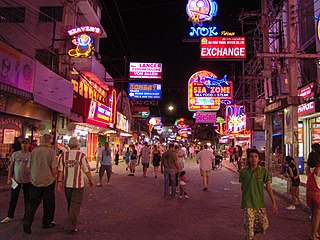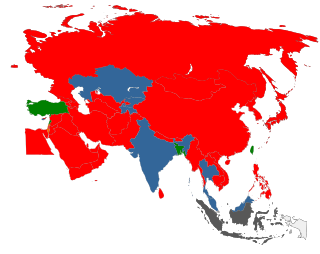Related Research Articles
Child sex tourism (CST) is tourism for the purpose of engaging in the prostitution of children, which is commercially facilitated child sexual abuse. The definition of child in the United Nations Convention on the Rights of the Child is "every human being below the age of 18 years". Child sex tourism results in both mental and physical consequences for the exploited children, which may include sexually transmitted infections, "drug addiction, pregnancy, malnutrition, social ostracism, and death", according to the State Department of the United States. Child sex tourism, part of the multibillion-dollar global sex tourism industry, is a form of child prostitution within the wider issue of commercial sexual exploitation of children. Child sex tourism victimizes approximately 2 million children around the world. The children who perform as prostitutes in the child sex tourism trade often have been lured or abducted into sexual slavery.

Prostitution in Thailand is not itself illegal, but public solicitation for prostitution is prohibited if it is carried out "openly and shamelessly" or "causes nuisance to the public". Due to police corruption and an economic reliance on prostitution dating back to the Vietnam War, it remains a significant presence in the country. It results from poverty, low levels of education and a lack of employment in rural areas. Prostitutes mostly come from the northeastern (Isan) region of Thailand, from ethnic minorities or from neighbouring countries, especially Cambodia, Myanmar, and Laos. In 2019, the Joint United Nations Programme on HIV/AIDS (UNAIDS) estimated the total population of sex workers in Thailand to be 43,000.
Shannon LaRhea Marketic is an American model and beauty pageant titleholder who was crowned Miss California USA 1992 and Miss USA 1992.

The legality of prostitution in Asia varies by country. There is often a significant difference in Asia between prostitution laws and the practice of prostitution. In 2011, the Asian Commission on AIDS estimated there were 10 million sex workers in Asia and 75 million male customers.

Jefri Bolkiah ibni Omar Ali Saifuddien III, is a member of the Brunei Royal Family. His elder brother is the Sultan of Brunei, Hassanal Bolkiah. Prince Jefri was the finance minister of his oil-rich country from 1986 to 1997. He also served as chairman of the Brunei Investment Agency (BIA) which invests much of the country's wealth and was responsible for overseas investments. Additionally, he is the Deputy Chairman 3 of the Jabatan Adat Istiadat Negara (JAIN).
Prostitution in Denmark was partly decriminalised in 1999, based partly on the premise that it was easier to police a legal trade than an illegal one. Third-party activities, such as profiting from brothel administration and other forms of procuring, remain illegal activities in Denmark, as do pimping and prostitution of minors.
Prostitution in Norway is illegal and a criminal act when sexual acts are purchased, but not when sold. The Norwegian law prohibiting the buying of sexual acts came into effect on 1 January 2009, following the passing of new legislation by the Norwegian parliament in November 2008. Soliciting and advertising "sexual services" is also illegal under the Norwegian Criminal Code section 378 and section 202(3).
Prostitution in Belize is legal, but the buying of sexual services is not. Associated activities such as operating a brothel, loitering for the purposes of prostitution and soliciting sex are also illegal.

Prostitution is legal and regulated in Bangladesh. Prostitutes must register and state an affidavit stating that they are entering prostitution of their own free choice and that they are unable to find any other work. Bangladeshi prostitutes often suffer poor social conditions and are frequently socially degraded.
Prostitution is illegal in Qatar and carries severe punishment of several years in prison. Prostitution normally takes place in bars, nightclubs and hotels. There are occasional clamp-downs and the prostitutes are arrested and deported.
Prostitution in Trinidad and Tobago is legal but related activities such as brothel keeping, soliciting and pimping are illegal.
Prostitution in Bulgaria is itself legal, but organised prostitution brothels, prostitution rings, or other forms of procuring prostitution procuring are prohibited. In the past, the Bulgarian government considered fully legalising and regulating prostitution.
Syria is a destination and transit country for women and children trafficked for commercial sexual exploitation and forced labor. A significant number of women and children in the large and expanding Iraqi refugee community in Syria are reportedly forced into commercial sexual exploitation by Iraqi gangs or, in some cases, their families. Similarly, women from Somalia and Eastern Europe are trafficked into commercial sexual exploitation. Foreign women recruited for work in Syria as cabaret dancers are not permitted to leave their work premises without permission, and they have their passports withheld—indicators of involuntary servitude. Some of these women may also be forced into prostitution. Anecdotal evidence suggests that Syria may be a destination for sex tourism from other countries in the region. In addition, women from Indonesia, the Philippines, Ethiopia, and Sierra Leone are recruited for work in Syria as domestic servants, but some face conditions of involuntary servitude, including long hours, non-payment of wages, withholding of passports, restrictions on movement, threats, and physical or sexual abuse. Syria may also be a transit point for Iraqi women and girls trafficked to Kuwait, the United Arab Emirates (U.A.E.), and Lebanon for forced prostitution. The Government of Syria does not fully comply with the minimum standards for the elimination of trafficking and is not making significant efforts to do so. Syria again failed to report any law enforcement efforts to punish trafficking offenses over the last year. In addition, the government did not offer protection services to victims of trafficking and may have arrested, prosecuted, or deported some victims for prostitution or immigration violations.
Kuwait is a destination and transit country for men and women for forced labor and commercial sexual exploitation. Men and women migrate willingly from Bangladesh, India, Pakistan, Sri Lanka, Nepal, Indonesia, and the Philippines to work as domestic servants or low-skilled laborers. Upon arrival, however, some are subsequently subjected to conditions of forced labor, such as restrictions on movement, unlawful withholding of passports, non-payment of wages, threats, and physical or sexual abuse. In addition, some women are forced into commercial sexual exploitation; for example, some female domestic workers are forced into prostitution after running away from abusive employers or after being deceived with promises of jobs in different sectors. Kuwait is also a transit country for South and East Asian workers recruited by Kuwaiti labor recruitment agencies for low-skilled work in Iraq; some of these workers are deceived as to the true location and nature of this work, while others willingly transit to Iraq through Kuwait, but subsequently endure conditions of involuntary servitude in Iraq. Some Kuwaiti nationals reportedly travel to destinations including Morocco, Egypt, Afghanistan, Pakistan, India, and Bangladesh to engage in commercial sex acts.
Prostitution in Northern Ireland is governed by the Human Trafficking and Exploitation Act 2015, which makes it illegal to pay for sex in Northern Ireland. Prior to the act coming into effect, prostitution in Northern Ireland was regulated by the same or similar laws to those in England and Wales, as it is elsewhere in the United Kingdom. At that time, prostitution in Northern Ireland was legal subject to a number of restraints which controlled certain activities associated with prostitution, such as soliciting, procuring, living on the proceeds of prostitution (pimping), exploitation of prostitutes, under-age prostitution, and keeping a brothel. However, devolution provided the opportunity for separate legislation in Northern Ireland.
Brunei is a destination, and to a lesser extent, a source and transit country for men and women who are subjected to trafficking in persons, specifically forced labor and forced prostitution. Men and women from Indonesia, Malaysia, the Philippines, Pakistan, India, Bangladesh, China, and Thailand migrate to Brunei for domestic or other low-skilled labor but sometimes face conditions of involuntary servitude upon arrival. There are over 88,000 migrant workers in Brunei, some of whom face debt bondage, non-payment of wages, passport confiscation, confinement to the home, and contract switching – factors that may contribute to trafficking. There were credible reports of nationals from South Asian countries subjected to nonpayment of wages and debt bondage in Brunei for up to two years to pay back foreign recruitment agents. Some of the 25,000 female domestic workers in Brunei were required to work exceptionally long hours without being granted a day for rest, creating an environment consistent with involuntary servitude. There are reports of women forced into prostitution in Brunei, and reports that women arrested for prostitution attest to having been victims of trafficking. Brunei is a transit country for trafficking victims in Malaysia, including Filipinas, who are brought to Brunei for work permit re-authorization before being returned to Malaysia.
Prostitution in Mali is legal, but third party activities such as procuring are illegal. Prostitution is common in Malian cities. UNAIDS estimate there to be 35,900 prostitutes in the country. Prostitution is on the rise, many having turned to prostitution because of poverty.

Women in Brunei are women living in Brunei Darussalam. The U.S. Department of State has stated that discrimination against women is a problem in Brunei.

Hassanal Bolkiah ibni Omar Ali Saifuddien III is the Sultan of Brunei since 1967 and the prime minister of Brunei since independence from the United Kingdom in 1984.
Since 1967, Sultan Haji Hassanal Bolkiah has ed, indirectly elected, and ex officio members, met regularly throughout the year and served solely as an advisory body for the purpose of proposing and approving laws and spending plans. The Royal Brunei Police Force (RBPF) and the Internal Security Department (ISD), which are overseen by the Prime Minister's Office and the Ministry of Home Affairs respectively, are in charge of maintaining order and enforcing the law in the nation.
References
- ↑ "The Legal Status of Prostitution by Country". ChartsBin. Retrieved 21 January 2018.
- 1 2 "Laws of Brunei - Penal Code" (PDF). Attorney Generals Chambers. 2016. Retrieved 21 January 2018.
- ↑ "Brunei unveils tough Sharia code". BBC News. 22 October 2013. Retrieved 21 January 2018.
- 1 2 Salanga, Elyas Isabelo (2 June 2009). "Looking Back: Showbiz scandals that raised public outcry". PEP. Retrieved 21 January 2018.
- 1 2 "Palace washes hands off Brunei beauties". Manila Standard. 30 September 1993. Retrieved 24 December 2013.
- ↑ Balingit, Ed (22 September 1993). "Bombshell on Brunei Beauties". Philippine Times Journal. pp. 1 & 6. Retrieved 21 January 2018.
- ↑ "Former Miss USA sues Sultan of Brunei over sex". The Nation. 9 March 1997.
- ↑ "Former Miss USA wants court to have jurisdiction over Brunei prince". Gadsden Times. 17 December 1997.
- 1 2 "Sultan denies he kept girl as slave". The Free Lance-Star. 5 March 1997.
- ↑ "Media frenzy follows suit of ex-Miss USA". The Nation. 6 March 1997.
- ↑ Callahan, Maureen (10 May 2014). "The sex-obsessed world of Brunei". New York Post. Retrieved 21 January 2018.
- ↑ "Miss USA won't sue Sultan of Brunei". Moscow-Pullman Daily News. 4 June 1997.
- ↑ Graves, David (19 March 1998). "Of Sultans and Swinging". The Age.
- 1 2 3 "Brunei 2017 Trafficking in Persons Report". U.S. Department of State. Archived from the original on 3 July 2017. Retrieved 21 January 2018.
 This article incorporates text from this source, which is in the public domain .
This article incorporates text from this source, which is in the public domain . - ↑ "Three Thais jailed, face caning for forcing a 17-year-old girl into prostitution in Brunei". The Nation. 8 April 2016. Retrieved 21 January 2018.